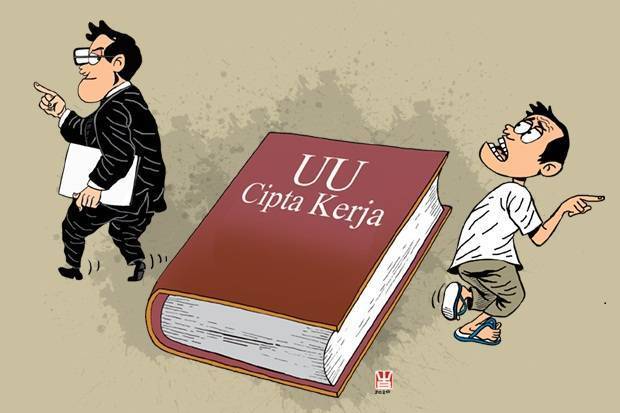Derivative Regulations on Job Creation Law Bring Ease for MSMEs
By: Alfisyah Dianasari) *
UMKM entrepreneurs are rescued by the government, thanks to the Job Creation Law and its derivative regulations. They get various facilities, ranging from simplified permits to coaching and assistance. The hope is that UMKM entrepreneurs will be able to rise again and be enthusiastic about selling, even though it is still in a pandemic era.
2020 is a time full of trials, because since March we have been attacked by the Corona virus. As a result, almost all sectors have collapsed, especially the economy. Because people’s purchasing power has decreased so that the merchandise is quiet. If it continues, it will be bad, because the economy will slow down, even stop.
This decline in purchasing power is also complained by MSME entrepreneurs. They feel nervous because the number of customers has dropped dramatically. In fact, trading is the main source of income, and you must be patient when your turnover decreases.
The government tries to help UMKM entrepreneurs with the Job Creation Law and its derivatives. In this law there is an MSME cluster and in its derivative regulations it is stated that business licensing is divided based on risk: low, medium, and high. Risks are assessed based on health, safety and the environment.
Because MSMEs are low risk, licensing is easy. Enough with the NIB alias business license number, then they have legal status. There is no need to take care of the HO permit, which is quite costly and the process is a bit complicated.
In addition, the permit is also easy. In the derivative regulations of the Job Creation Law, it is stated that the legality of MSME businesses can be obtained through online and offline channels. So business people can choose to apply for a business license directly to the official office, or through the official website. Permits can be obtained in just 7 working days, very quickly and easily.
If the UMKM entrepreneur already has a permit, then he will benefit, because it has legal status. With this status, he can apply for credit to the bank and complete other requirements. So that loans will be disbursed easily, because UMKM entrepreneurs are considered to have a legal business and are recognized by the state.
Credit from the bank must be used as additional capital, so that MSME entrepreneurs can start production again. He can be optimistic in selling and promoting, and confident that people’s purchasing power will rise again. So that his old customers will come back because they are compatible with his merchandise, and he gets a large enough profit.
After obtaining a permit, this legality does not need to be extended. The points in this derivative rule of the Job Creation Law make it very easy for MSME entrepreneurs, because they don’t need to re-register to get a business license like they used to. Except for MSME entrepreneurs in the culinary and cosmetic fields, they must periodically renew the halal status of their products.
Many of the MSME entrepreneurs are still beginners or just know how to sell without knowing the current marketing theory. The government helps them by providing assistance, so that small and medium-sized businesses know how to market their products without having to force others. But you can use social media and blogs as a place for promotion.
A number of facilities provided to MSME entrepreneurs show how much government attention to them. Because small and medium businesses are the backbone of the country’s economy, they must be assisted by the Job Creation Law and its derivative regulations. MSMEs must be saved, so that the wheels of the Indonesian economy can roll more quickly.
UMKM entrepreneurs can be enthusiastic again in running their business, because they get easy licensing from the government. There is also no need to be afraid of wordy bureaucracy, because this ancient rule was trimmed during President Jokowi’s administration. They just need to focus on doing business and keep trying hard, so that their business will run smoothly.
) * The author is a citizen living in Cinere-Depok
